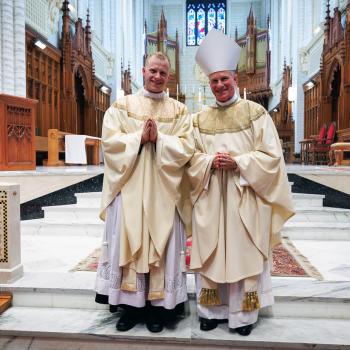Lectionary Reflections
Luke 21:5-19
November 17, 2013
I was asked to be on a panel sponsored by the Dallas Institute of Humanities and Culture called "Understanding Tragedy: The Impact of the JFK Assassination on Dallas" held November 1, 2013. About 800 people from the Dallas area attended. It was a very enriching and fruitful day of memory and reflection.
There were several keynote speakers and sixteen responders from four different areas: religion, politics, arts and humanities, and journalism. I was asked to be on the religion panel. When asked, I said, "I am happy to participate, but I didn't live here when John Kennedy was killed and, while I know a good bit about religion, I don't consider myself to be an historian or a political commentator."
"We would still like you to participate," the organizer told me. "There is nothing you need to do to prepare. Just come and respond to each of the keynoters from your area of expertise."
I agreed and immediately began preparing. I read up on JFK's background, campaign, and the dynamics of his brief presidency, as well as its historical context, nationally and globally. I refreshed my memory on the details of his visit to Dallas and the assassination and its aftermath. I read up on the impact the tragedy has had on Dallas since 1963. As it turned out, while I only spoke for a total of fifteen minutes throughout the day in response to various keynoters, my preparation offered the basis for my responses.
In my experience, no preparation is ever wasted, and things go better when you prepare. The choir anthem goes better when the choir is prepared. Discussions go better when everyone has read the book and comes to class prepared. Preaching goes better when I prepare. I tell my students in my Introduction to Preaching classes that preparation is an important source of confidence, a desired companion to the Presence of the Holy Spirit.
Of course, I realize you can't prepare for everything. I remember reading in Ecclesiastes these words: "For no one can anticipate the time of disaster. Like fish taken in a cruel net, and like birds caught in a snare, so mortals are snared at a time of calamity, when it suddenly falls upon them" (9:12).
This apocalyptic passage from Luke speaks of calamities of three kinds: the destruction of the temple, natural disasters that will accompany the end of the present order, and the persecution of Christians by their enemies. It's worth a few moments to contemplate the calamities for which we cannot prepare.
The Destruction of the Temple, 21:5-6
All three synoptic gospels contain the prediction of the temple's destruction. The passage refers to the building of Herod's Temple, begun in 19 B.C. and still under construction during Jesus' lifetime. The temple was completed in A.D. 64 only to be totally razed six years later in the First Jewish Revolt. It was considered one of the most beautiful buildings in the Roman Empire. As the house of God, its destruction would seem be to the end of the world in the minds of the people. The destruction of the temple may have been a foretelling after the event. In other words Luke is theologizing about the temple's destruction by placing a prediction on the lips of Jesus. (Patella, p. 135)
Earthquakes, Wars, and Famines, 21:7-11
The particular historical events mentioned in verses 7-11 are hard to pinpoint. Wars, earthquakes, famines, and plagues happen in every period of human history. No one can be prepared for any of these occurrences.
The Coming Persecution, 21:12-19
The early Christians faced persecution at the hands of both rulers of synagogue and state. These verses are meant to console and strengthen believers facing persecution. (Patella, p. 136)
We can partially prepare for some of these kinds of historical and natural disasters and sufferings. Historical conditions can be analyzed and we can try to learn from the mistakes of the past. Meteorologists can warn us of coming tornadoes, hurricanes, and even earthquakes. Still, the author of Ecclesiastes was correct in pointing out the general truth that "No one can anticipate the time of disaster."
We can live in a constant state of dread, but that is not the same as preparation. The best way to prepare for calamity that could happen at any time is to always be looking for Christ in every person and circumstance. (Patella, p. 136)
And when we are doing that, we find that we accept and live by the apocalyptic advice Luke's Jesus offers in this passage.
We resist following false teachers and leaders.
"Many will come in my name and say 'I am he!' and 'The time is near.' Do not go after them" (21:8).
We discern the presence of God in Christ in our hardships and witness to others of our faith.





